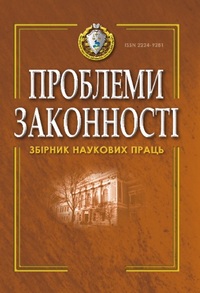Формування еколого-правової науки: ресурсний аспект та проблеми його інтеграції
Formation of ecological and legal science: resource aspect and its integration problems
Author(s): Anatolii P. Getman, Vitaly ZuievSubject(s): Law, Constitution, Jurisprudence, Civil Law
Published by: Національний юридичний університет імені Ярослава Мудрого
Keywords: environmental law; natural-resource law; natural resources; environmental resources; ecological and legal science; екологічне право; природоресурсне право; природні ресурси; екологічні ресурси.
Summary/Abstract: Problem setting. Social and environmental issues of waste management facing society relatively recently, but showed a tendency to expand and deepen, which in turn caused the necessity of formation of effective policy in this area.Recent research and publications analysis. Some aspects of the present stage of the formation of environmental law and its relationship to nature and resources law, structural and systemic connections was studied by various researchers in the context of environmental policy and legislation analysis, regulation of wildlife relationships, expanding the scope of regulation of resource. In particular, they can mark out V. Andreytsev, A. Getman, M. Krasnova, N. Malisheva and others. However, comprehensive studies of this policy is currently not available.Paper objective. The purpose of the article is a theoretical analysis of the current state of environmental law, the formation of the next stage of development of natural resource relationships, their expansion and transformation into a resource (ecologic and resource) in order to adequately respond to the differentiation and complexity of structural and systemic linkages.Paper main body. The development and dynamics of the environmental, natural resources legislation is largely driven by global and European processes and requires constant updating in order to overcome gaps, timely and adequate response to contemporary challenges, changes in value paradigms and so forth. One of these problems is the development of traditional branches of law and directions research that, in turn, raises the question of substantive content, structural and systemic links of these areas of law. Any delay in the establishment of the theoretical and methodological and scientific and legal framework for a new legal phenomena in the framework of ecological and legal science creates the preconditions for the expansion of research not only to them but also in relation to the already well-established system of law and the separation of the industry.A promising seems the further transformation of natural resource rights in the resource, whose task will be to not only relations concerning those or other natural objects, but also the products of their use, and natural phenomena, the establishment of resource-saving requirements, the introduction of specific indicators of resource costs and the like. Such a situation we are seeing now in soil legislation, which regulates the use of man-made mineral deposits, which, in fact, lost the status of a natural object, but are important for their conservation. A similar situation arises in the field of waste management, which are increasingly seen it as a potential source of resources and nature conservation.It is proved that with the current approach, when the subject and its activity are taken as a basis for regulation in isolation from the goals of legal regulation, the values and ideological component of the legal regulation, which had a negative impact on its quality are lost. It should be pointed out that in many cases such restrictions are connected with artificial internal limits of innovations of eco-legal science, caused by the use of the traditional concepts of “nature”, “natural resources”, “natural objects”. This causes an urgent need to review the use of these terms, the expansion of concepts. One way to become more active use of the terms “resource use, “eco use”, “resources”, “environmental resources”, “environmental objects” and so forth.Conclusions of the research. Stage of relatively independent existence of natural resource law, its autonomy outside the complex ecological and legal science has already passed and now destructively affects both its development in general and on the development of its constituent elements, slows its methodological development, creates the prerequisites for scientific expansion of specialists in other sectors of law that use internal scientific debate and controversy as a confirmation of their own conclusions about the artificial synthesized nature of environmental law, artificiality of scientific problems and so on. One of the ways to integrate and harmonize the natural resource component within the environmental law is to change its focus from solely having binding traditional natural objects in favor of a more progressive and promising theory of the resource or the ecological and resource rights that can harmoniously incorporate both traditional (established), and innovative approaches to the maintenance of ecological and legal relations, their expansion and diffusion within a single methodological approach and legal doctrine, which is the fundamental goal of ecological and legal science, defined as the environment, the use of environmental resources and ecological security of humanity.
Journal: Проблеми законності
- Issue Year: 2016
- Issue No: 132
- Page Range: 104-123
- Page Count: 20
- Language: Ukrainian

